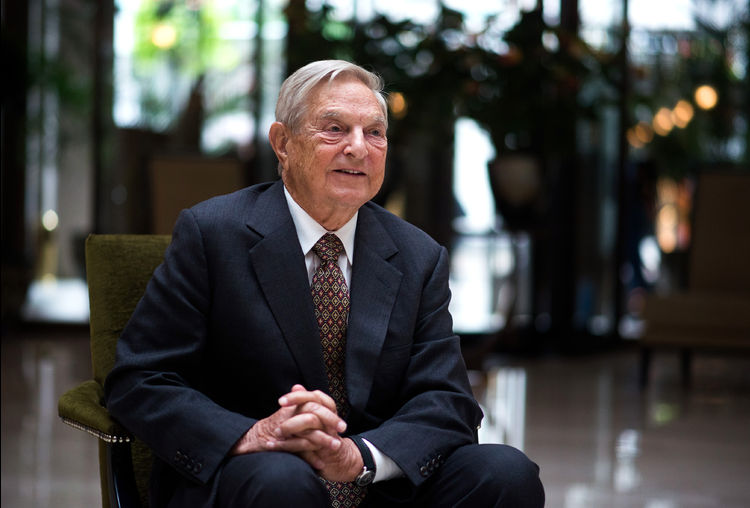- Soros Says Markets to Slump With Trump, EU Faces Disintegration
It’s tough to be gloomier than billionaire George Soros right now.
America has elected a would-be dictator as president, the European Union is disintegrating, U.K. Prime Minister Theresa May won’t last long as her nation prepares to secede from the EU, and China is poised to become an even more repressive society, the investor told Bloomberg Television’s Francine Lacqua from the World Economic Forum in Davos.
“It is unlikely that Prime Minister May is actually going to remain in power,” Soros said. She has a divided cabinet and base and Britons are in denial about the economic impact of Brexit, he said.
On Tuesday May, who took office in July after the U.K. voted to leave the EU, set out her strategy for a clean break from the 28-nation trade bloc and pitched the nation as open to making free trade deals globally.
Soros had particularly harsh words for U.S. President-elect Donald Trump, who will be inaugurated on Friday. Calling Trump a “con man,” Soros said the billionaire will fail because his ideas are contradictory and his White House advisers and cabinet members will fight with each other, an apparent reference to the conflicting views expressed during Senate confirmation hearings. The stock market rally since the November election, spurred by Trump’s promises to slash regulations and boost spending, will come to a halt, Soros said.
“Uncertainty is at a peak, and actually uncertainty is the enemy of long-term investment,” said Soros, the chairman of Soros Fund Management. “I don’t think the markets are going to do very well. Right now they’re still celebrating. But when reality comes, it will prevail.”
Soros’s Bad Bet
Soros’s pessimism has been costly to him. He lost nearly $1 billion as a result of the rally spurred by Trump’s surprise win, the Wall Street Journal reported earlier this month. The octogenarian’s wagers became more bearish immediately after Trump’s victory, but the S&P 500 Index has jumped 5.8 percent since Election Day.
The EU, Soros added, is disintegrating following last year’s Brexit vote and Italian referendum — a course that must be reversed. The trading bloc has become dysfunctional because it is governed by laws that are “not appropriate to the current circumstances” and not easily changed, he said.
“If Europe breaks down, the consequences will be very dire,” the investor said. “But I do see a way it could be saved, and this is also recognized by many of the people in Brussels. They can’t say so publicly, but they know that Europe is not functioning.”
China Pessimism
Soros continued to take a dim view on China, saying the nation is at a decision point and must choose whether to become a more open or closed society as it transitions to a consumer-led economy.
“China has not actually succeeded yet in changing its growth model and probably won’t do it in the next two years because Xi Jinping wants to maintain an unsustainable rate of growth,” he said. Xi “is doing that by rekindling the furnaces and producing more goods that are already in supply.”
Soros’s outlook on China has yet to prove accurate. At last year’s Davos gathering, Soros said China’s economy is facing a hard landing, a situation that will contribute to global deflationary pressures and prompted him to wager against U.S. stocks.

 Forex3 weeks ago
Forex3 weeks ago


 Naira2 weeks ago
Naira2 weeks ago
 Billionaire Watch2 weeks ago
Billionaire Watch2 weeks ago




 Naira2 weeks ago
Naira2 weeks ago




 Naira4 weeks ago
Naira4 weeks ago




 Naira2 weeks ago
Naira2 weeks ago


 Naira1 week ago
Naira1 week ago
 Banking Sector4 weeks ago
Banking Sector4 weeks ago





















